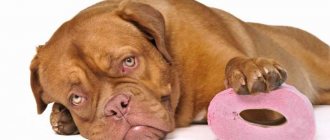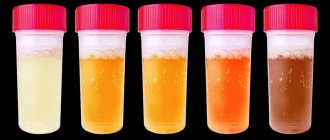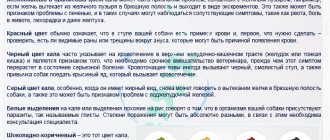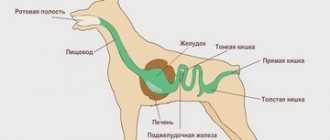Unexpected diarrhea in a Spitz causes justified concern for the pet owner. Both food and internal pathologies can provoke stool disorders. It is important to promptly provide first aid to the animal at home and contact a veterinary clinic to find out the cause of the gastrointestinal tract disorder.
Symptoms and pattern of bowel movements
Diarrhea is spontaneous. A few minutes ago, a pet that is feeling well may begin to diarrhea. It is important to pay attention to the color of the stool, the presence or absence of impurities in it.
In addition to diarrhea, does a Pomeranian vomit?
Yes
31.97%
No
68.03%
Liquid feces can be:
- yellow;
- black;
- green;
- with blood;
- with mucus
The color of the stool can suggest a problem that caused diarrhea in the Spitz.
Black diarrhea sometimes indicates internal bleeding. In this case, immediate consultation with a doctor is required.
If the stool is yellow, it can be assumed that there is a malfunction of the liver or helminthiasis.
If a Spitz has yellow diarrhea with a strong unpleasant odor, then the development of parvovirus enteritis or coronavirus gastroenteritis should be suspected. In the presence of these pathologies, vomiting is also observed in the animal.
White stools indicate a lack of bile in the feces, which is often a symptom of bile duct blockage.
Bloody diarrhea in some cases is a sign of a viral infection or intestinal injury (after bones).
The presence of blood and mucus in the stool, vomiting, and temperature indicate salmonellosis in a Spitz puppy.
Green diarrhea can signal putrefactive processes or fermentation in the intestines, dysbacteriosis, viral and bacterial infections, and pathologies of the gastrointestinal tract.
With blood or other impurities
The presence of blood or other impurities in diarrhea can have serious consequences. The causes of diarrhea with blood are dangerous infections, for example, salmonellosis, food poisoning, inflammation, internal injuries, damage to the walls of the anus from sharp bones or other objects.
Also, diarrhea with blood can be the result of hemorrhagic leptospirosis, a fatal disease that affects the liver, blood vessels, and other body systems, and parvovirus enteritis, a severe infectious disease with a high fatality rate.
Mucus contained in diarrhea indicates an inflammatory process in the large intestine, which often occurs after the use of deworming medications. In this case, the worms die, are digested and turn into mucus, which leaves the body with diarrhea in the form of mucus.
When to see a doctor
A Spitz can have loose stool once without any unpleasant consequences. If your dog has diarrhea, but is generally feeling well, it is worth observing the animal for 24 hours and skipping one feeding. If the diarrhea subsided the next day, then there is no cause for concern.
Frequent loose bowel movements, vomiting, mucus, blood in the stool, and a general lethargic state are good reasons to consult a veterinarian.
Light food for dogs
Dogs are carnivores, so the concept of light food is a little different from humans. What to feed a dog if it is poisoned so that the food is completely digested? Here is a list of suitable products:
- lean meats - beef and horse meat;
- boneless chicken;
- liquid porridge with broth: oatmeal, rice, buckwheat.
After a few days, you can additionally include in the diet:
- chicken eggs;
- skim cheese;
- beef liver;
- sea fish;
- boiled carrots, beets;
- butter.
Meat and fish are ground in a meat grinder and boiled.
Egg whites are better digestible when boiled; the yolk can be given raw if you are confident in the quality of the eggs. The same applies to the liver - if it is fresh and not infected, then you can give it raw. Butter is given in small quantities, other fats are temporarily excluded from the diet. Raw foods are fed in small quantities. They stimulate the production of gastric juice, the reproduction of beneficial microflora, and intestinal motility.
It is not recommended to give millet, barley, semolina and pearl barley porridge, as they are difficult to digest. But if your pet is accustomed to just such cereals, then you can mix them with light cereals in a ratio of 1:1 or 1:2.
To stimulate intestinal muscle contractions during constipation, you can give your dog some fresh carrot juice.
Diagnostics
If your pet has a frequent urge to defecate, black or red feces, vomiting, lethargy, tremors of the limbs, abdominal pain, fever, you should definitely seek help from a doctor for diagnosis.
The following types of laboratory tests are prescribed:
- blood analysis;
- stool analysis;
- Ultrasound;
- X-ray of the abdominal cavity.
Based on the results of the examination, treatment is carried out aimed at eliminating the cause of the bowel disorder.
Light food
As with foodborne intoxication in humans, all food for dogs after poisoning is divided into:
At the same time, due to the canine nature, the concept of light food for humans and animals differs. For the latter, the optimal food in the first days is considered to be:
- lean meats like beef,
- chicken fillet,
- liquid porridge cooked in broth.
From cereals for porridges the following are welcome:
Only after the owner is convinced that the pet is recovering smoothly can other food products be added. But the partial lifting of the ban does not indicate that the dosage will now be uncontrolled. The furry patient will be allowed to eat in moderation:
- chicken eggs,
- low-fat cottage cheese,
- beef liver,
- boiled carrots,
- boiled beets,
- sea fish,
- butter.
In order not to overload the still weakened digestive system, at the preliminary stage of cooking all meat and fish should be ground in a meat grinder. Only after this can you send them to cook.
First aid
Before treating an animal, the owner needs to assess the general condition of the dog, the consistency of the feces, its color, pay attention to whether there are symptoms such as vomiting, lethargy, apathy, whether the animal has retained its appetite and activity.
What to do if your Pomeranian has diarrhea before visiting the veterinarian:
- remove food for 8-12 hours;
- give adsorbent;
- Provide the dog with boiled water.
First aid at home is provided to the pet using adsorbents.
Orange can be given activated carbon if there are no other enterosorbents in the house. The drug is used at the rate of 1 tablet per 10 kg of animal weight. For example, if the dog weighs 2.5 kg, then the pet is given ¼ tablet. An animal weighing 5 kg will need half of one unit of the drug.
A Spitz with diarrhea is given a fasting day. In this case, the pet must have constant access to boiled water.
If the dog’s condition is satisfactory: it is active, there is no frequent urge to defecate, and there is no vomiting, then adsorbents are given for another 2-3 days. In this case, there is no need to visit the veterinary clinic.
If a water-starvation diet and enterosorbents do not produce results, you should visit a veterinarian.
Pomeranian diarrhea treatment at home
Note that diarrhea in puppies often occurs after deworming or after vaccination. As a rule, this condition manifests itself a few hours after taking anthelmintics or administering a prophylactic vaccine.
Diarrhea in a puppy after vaccination is due to the body’s reaction to the introduction of foreign antibodies with the vaccine.
Moreover, today, thanks to the use of modern biological products for immunization, loose stools in puppies are extremely rare.
In addition to intestinal upset, other manifestations are possible on the first day (vomiting, nausea, decreased activity, allergies, drowsiness, refusal to eat).
Adverse symptoms after vaccination should subside within 24-36 hours. If the pet’s condition has not returned to normal, the puppy is getting worse, consult a veterinarian. Acute debilitating diarrhea, vomiting, lethargy, and other symptoms indicate the onset of a disease that was latent and intensified after preventive immunization.
Long-term use of pharmacological drugs also causes stomach upset in animals due to an imbalance of beneficial intestinal microflora. A similar condition is noted after a course of antibiotic-antiretroviral therapy or treatment with sulfonamides.
It is possible that the puppy ate something during a walk or as a treat; food from our table was used. Therefore, when walking with your pet, control its behavior and be sure to stop it from picking up dangerous “goodies” from the ground, which can cause severe poisoning.
Diarrhea in newborn puppies
Acute diarrhea in newborn puppies is a very alarming symptom. The immune and digestive systems of babies are not fully developed.
The gastrointestinal tract does not contain all the enzymes and beneficial microorganisms responsible for digestion. Therefore, the digestive tract of small puppies is very vulnerable.
Any negative factors can cause various systemic and functional disorders and cause disruptions in the functioning of the gastrointestinal tract.
If a one-month-old puppy is bottle-fed, if the feeding regime is violated, overfeeding, and also if the baby receives low-quality, low-quality food (mother's milk substitutes, formula), diarrhea is very often noted.
Stomach upset in one-month-old puppies can be caused by milk. Puppies receive immune protection, nutrients, and vitamins from their mother's milk. Therefore, if a lactating bitch is sick, weakened, or receives a poor-quality, unbalanced diet, this will affect not only her health, but also the condition of the babies.
With slight overfeeding, the excrement has a yellowish color, with severe overfeeding it has a green, bright yellow color, which is explained by the presence of unchanged bile in the feces. Caused by too rapid movement of feed through the intestines. Gray liquid stool indicates a violation of enzyme activity, which is caused by overfeeding.
In a one-week-old puppy, an upset stomach may signal infection with streptostaphylococcal infection or E. coli (dysbacteriosis).
Escherichia coli is a conditionally pathogenic microorganism that lives in the digestive tract, but under the influence of negative factors it manifests its pathogenicity and multiplies quickly, which leads to the development of enteritis and colibacillosis.
These diseases are most often diagnosed in weakened puppies or in overfed “artificial” puppies.
Intestinal infections in one- to two-month-old puppies occur quite aggressively, in an acute form, and can cause the death of the entire litter. Therefore, treatment must be carried out immediately. The veterinarian will prescribe the medications and treatment course based on the diagnostic results and the root cause.
Clinical picture of diarrhea
Diarrhea (diarrhea) is a condition characterized by frequent bowel movements. The excrement has a mushy, thin, watery consistency. Diarrhea in dogs can be acute or chronic, which occurs periodically if the negative factors that caused the diarrhea continue. But as a rule, constant diarrhea indicates profound changes and disturbances in the body.
As already noted, indigestion is not an independent separate disease, but a symptom of some pathology, illness, or malfunction in the body. Therefore, in addition to diarrhea, owners should be wary of the following symptoms:
- pallor, yellowness, cyanosis (cyanosis) of mucous membranes;
- lethargy, apathy, depression, drowsiness;
- lack of response to external stimuli;
- refusal of food and favorite treats;
- dirty fur near the anus;
- increase in tummy volume;
- mucous, mucopurulent discharge from the nose, eyes;
- sudden increase/decrease in temperature;
- chills, fever;
- cough, difficulty shallow rapid breathing;
- change in heart rate;
- painful defecation, urination;
- refusal of water or vice versa, increased thirst.
The clinical picture, severity, and intensity of symptoms, if they are caused by an infection or disease, depend on the stage, form of the disease, individual characteristics, resistance, and immune potential.
If you notice that the puppy is not eating anything, has become lethargic, apathetic, and other side symptoms are noticeable, do not delay your visit to the veterinarian.
The faster qualified assistance is provided, the greater the chances of saving your beloved pet. Most infectious and bacterial diseases have an aggressive course and occur in an acute, subacute form. Some diseases can be cured at the initial stage of their development. At the same time, uncontrolled use of drugs or self-medication will not produce results and can cause serious consequences.
Source: https://dagorthodoxy.ru/ponos-u-shpica-lechenie-v-domashnih-uslovijah/
Treatment options
There is no general treatment plan for diarrhea in a Spitz; everything is individual in each case. The choice of drug depends on the disease that provoked diarrhea in the Spitz.
If the pet’s condition is serious, infusion therapy is prescribed in a veterinary clinic to relieve intoxication, prevent dehydration and water-electrolyte imbalance.
If a bacterial infection is detected, antibiotics are prescribed.
In case of helminthic infestation, antiparasitic medications are prescribed.
If liver problems are detected, medications are used to improve liver function.
Medicines should be prescribed by a veterinarian after receiving diagnostic results. Self-medication can cause deterioration of the pet’s condition and its death.
Drugs
At home, treatment of diarrhea in a Spitz is carried out using adsorbent drugs. These include:
- Smecta;
- Polysorb;
- Enterosgel;
- Enterozoo.
In addition to enterosorbents from drugs, antispasmodics are recommended to relieve pain in the abdominal cavity (No-Shpa).
During diarrhea, the dog can be given oak bark powder (0.5-1 g of dry raw material), Imodium or Loperamide (0.2 mg per 1 kg of dog weight). The last two drugs can only be used as prescribed by a doctor. Self-medication can lead to the death of your pet.
If your Pomeranian has both diarrhea and vomiting, you should not give your pet anti-diarrheal medications until you visit a veterinarian. In this case, the animal is given 1/3 of the contents of a sachet of Smecta, diluted in a small amount of boiled water. You can give the product up to 3-4 times a day.
Diet
After a water-starvation diet, you need to start feeding your Spitz in small portions and easily digestible food.
If the dog ate commercial food, then you should purchase medicinal canned food from the same company in the GASTRO INTESTINAL series.
Pomeranians on a natural diet during diarrhea are given rice, to which boiled chicken or turkey breast is added.
You should stick to the diet for 2-3 weeks, gradually returning to your usual way of eating, avoiding errors.
How to treat diarrhea in a dog
After contacting your veterinarian, undergoing a detailed examination and taking tests, you must immediately begin to follow the recommendations prescribed by the doctor.
To stop diarrhea or vomiting, Regidron solution is usually given, following the instructions, based on the size of the pet, from 200 ml or more.
If an ulcer or gastritis is detected, astringent and enveloping drugs are prescribed. Then drugs to restore intestinal microflora: medications containing bifidobacteria, lactobifadol.
After intoxication, you can use medications such as enterosgel, enterodes or polyphepan.
During food poisoning, the Spitz is prescribed a starvation diet for a day, a large volume of water, and you can also give a little weak decoction of rice or oak bark.
Parasitic or infectious infection is treated with antibiotics.
To prevent recurrence of stool disorders, you can introduce a soft diet. It’s better to start with a light broth, then you can add a mixture of half white rice and lean meat (or add 1-2 tablespoons of natural yogurt); a mixture of cooked white rice and low-fat cottage cheese.
Prevention
The following preventive measures will help prevent the occurrence of diarrhea in your Spitz in the future:
- feeding fresh food;
- compliance with recommended nutritional portions;
- absence of unsuitable foods for Spitz in the diet;
- timely deworming;
- when changing the type of food, a gradual transition to a new food.
Regular visits to the veterinarian, proper feeding and monitoring the health of your pet will help prevent problems with the gastrointestinal tract in your Spitz. If your animal has periodic diarrhea, you should undergo diagnostics to identify the cause.
Causes
In a puppy and an adult Spitz, diarrhea can be caused by the following reasons:
- infections;
- parasites;
- poisoning;
- binge eating;
- inflammation of the gastrointestinal tract;
- change of feed;
- improper feeding;
- transition from one type of food to another.
Acute diarrhea in a Pomeranian can be caused by infections such as parvovirus enteritis or coronavirus gastroenteritis.
Salmonella can cause diarrhea in Spitz puppies under 8 months of age. One of the reasons for the development of infection is the inclusion of raw eggs in the dog’s diet.
In young Spitz dogs, diarrhea is often caused by a parasitic disease such as giardiasis. In the acute course of the disease, bloating and tenderness of the abdomen is observed. Diarrhea alternates with constipation. This symptomatology is also characteristic of helminthic infestations.
If your pet picks up any object or piece of food from the ground while walking, there is a risk of developing poisoning. Expired or improperly stored food can also cause intoxication in an animal.
Regular overfeeding of a Spitz can not only lead to stool upset, but also threatens subsequent obesity.
The cause of diarrhea can be pathologies of the gastrointestinal tract of an inflammatory nature. These include gastritis, ulcers, enteritis.
Malabsorption syndrome caused by intestinal pathologies is accompanied by diarrhea in dogs. The pathological condition is dangerous for the pet due to inability to absorb nutrients obtained from food.
Often a Spitz is vilified because the owner feeds the pet incorrectly, including prohibited foods in its diet. These include grapes, mushrooms, everything fatty, spicy, salty. High-fat cow's milk can also cause diarrhea in some representatives of the breed.









